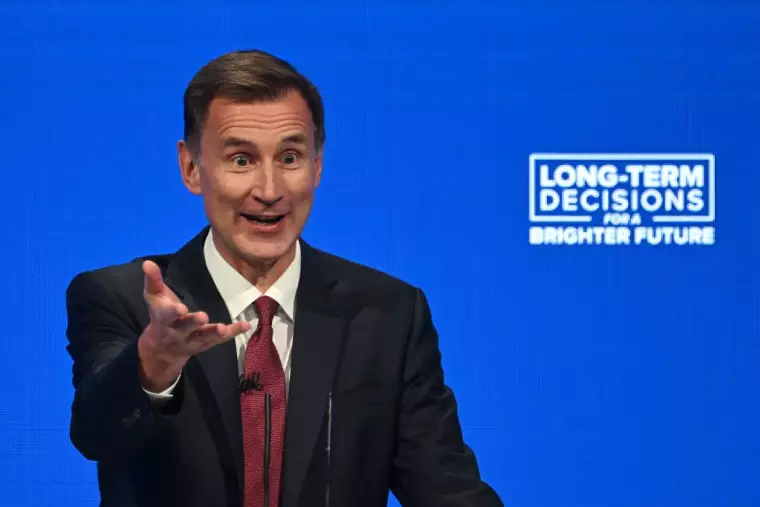Investment in factories, but less aid for the unemployed: London will present a “growth” budget on Wednesday to try to revive the appeal of the conservative party in power and lagging behind in the polls before the legislative elections scheduled for next year.
“The autumn budget statement will focus on how to restart the economy in a healthy way, by freeing up investment, getting people back to work and reforming our public services,” summarized Finance Minister Jeremy Hunt on Friday. .
Mr. Hunt is particularly under strong pressure to provide his electoral base with tax cuts, but this supporter of budgetary orthodoxy insists that he will only do so in a “responsible” manner.
“I want to show people that there is a path to tax cuts, but we also want to be honest, and it’s not going to happen overnight,” he said on Times Radio on Sunday. .
According to the British press, Mr. Hunt would, however, consider reducing certain taxes for businesses as well as the inheritance tax, which concerns a very small fraction of the wealthiest Britons.
Enough to arouse the ire of NGOs who are urging aid before winter for the most deprived.
Especially since one of the first measures, announced in advance, of this “autumn budget” concerns a restriction of social assistance: the government plans “more severe sanctions” against people benefiting from allowances who do not seek a job while they could, as part of a “Return to Work Plan”.
The United Kingdom indeed suffers from a very high rate of inactivity, but it is notably due to a number of long-term sick people which has soared since the pandemic.
Given the “scary performance of the ‘Tories’ (conservatives, editor’s note) in the polls, the budget declaration represents a last opportunity this year for the government to promote a vision that appeals” to the electorate, commented Anand Menon, professor of politics at King’s College London.
– Thumbs up –
During a speech on Monday, Prime Minister Rishi Sunak welcomed the fact that his government had “halved inflation”, which had shown a clear decline to 4.6% in October, against more than 10% at the start of the year, even if he admits that “the work is not finished, there are still people who are having difficulties”.
However, the country “must prioritize the supply side of the economy” rather than putting money in the pockets of consumers, he added, justifying the emphasis the government has placed on businesses. and industry in its first budget announcements.
The decline in inflation is double-edged: if it can give a boost to state accounts by reducing debt service, it could also result in a reduction in tax revenue.
Activity remains sluggish in the country: the United Kingdom stagnated in the third quarter, slowing down after growth of 0.2% in the previous quarter, and the risk of recession has not been ruled out, while on the job market, job offers are becoming rarer.
The Sunak government has already indicated that it will inject 4.5 billion pounds into eight industrial sectors: automobiles, aerospace, green energies and life sciences in particular.
After canceling part of the route of the HS2 high-speed line, a colossal project with daunting cost overruns, the government will also invest 8.3 billion pounds on the sums thus saved to repair “5,000 potholes”, and facilitate the lives of motorists.
The environmental NGO Greenpeace deplores that London is letting “the United States, the European Union and China fall behind (the United Kingdom) in the race for green technologies”, knowing that Rishi Sunak has initiated a clear brake on the climate transition this summer, with the announcement of hundreds of new hydrocarbon exploration and drilling permits in particular.
“We urgently call for a coherent plan to stimulate the economy, help ordinary people with the cost of living and tackle the climate crisis” by focusing on “renewable energy, home insulation and decarbonization of transport”, continues the NGO.
This article is originally published on boursorama.com


